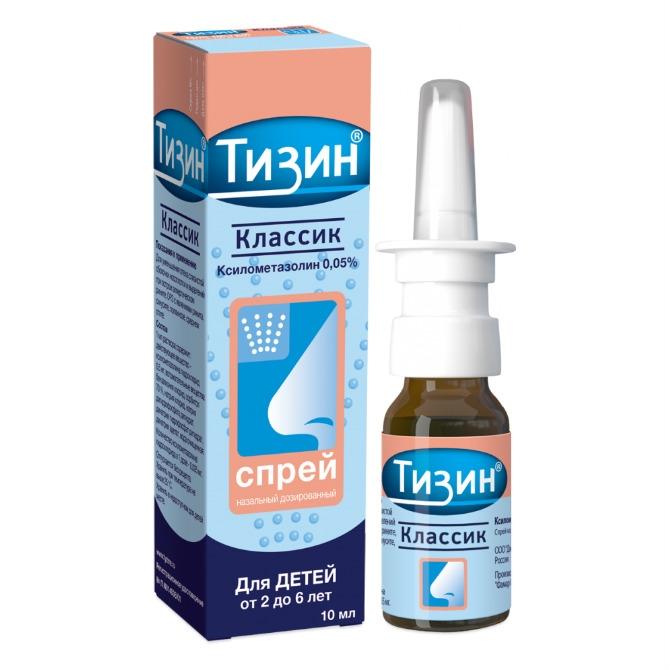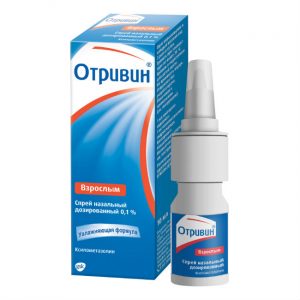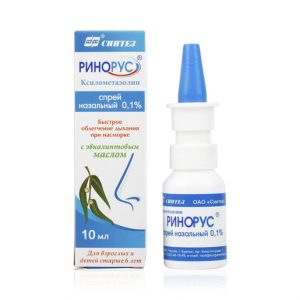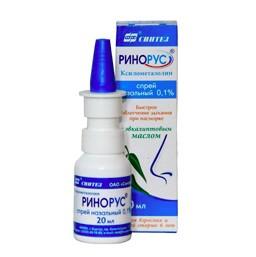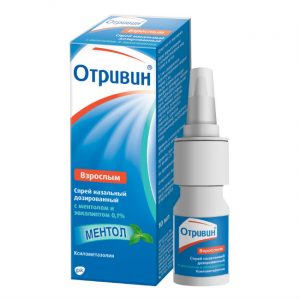Description
Release form
Dosage nasal 0.05%
Pharmacological action
Pharmacotherapeutic group
– decongestant – vasoconstrictor (alpha-adrenergic agonist).
ATX code – R01AA07
Pharmacodynamic properties of
Xylometazoline (an imidazole derivative) is a sympathomimetic drug with alpha-adrenergic activity. It has a vasoconstrictor effect and reduces swelling of the mucous membrane.
Action usually begins within 5 10 minutes. The drug facilitates nasal breathing by reducing swelling and hyperemia of the mucous membrane, and also improves discharge discharge.
Pharmacokinetic properties of
When applied topically, it is practically not absorbed, plasma concentrations are so low that they cannot be determined by modern analytical methods.
Indications
To reduce swelling of the mucous membrane of the nasopharynx and secretions in acute allergic rhinitis, acute respiratory infections with rhinitis, sinusitis, pollinosis, otitis media.
Preparing the patient for diagnostic procedures in the nasal passages.
Contraindications
Hypersensitivity to any of the components of the drug, while taking monoamine oxidase inhibitors (MAOs) or other drugs that can cause high blood pressure, hypertension, tachycardia, severe atherosclerosis, glaucoma, atrophic rhinitis, surgical interventions on the meninges (history), children’s age (up to 6 years for a dosage of 0.1%, up to 2 years for a dosage of 0.05%).
Precautions – IHD (angina pectoris), prostatic hyperplasia, thyrotoxicosis, diabetes mellitus, pheochromocytoma, in patients with hypersensitivity to adrenergic agonists, accompanied by symptoms of insomnia, dizziness.
Pregnancy and lactation
Carefully controlled and relevant studies in pregnant women have not been conducted. The drug should not be used during pregnancy unless the potential benefit of treating the mother outweighs the potential risk to the developing fetus.
Lactation
It is not known whether xylometazoline or its metabolites passes into breast milk, so the drug should not be used during breast-feeding.
Special instructions
Long-term use and overdose of sympathomimetics that have a decongestant effect can lead to reactive hyperemia of the nasal mucosa.
The recoil phenomenon can cause airway obstruction, which leads to the fact that the patient begins to use the drug repeatedly or even constantly. This can lead to chronic swelling (drug rhinitis), and as a result, even to atrophy of the nasal mucosa (ozena).
In case of chronic rhinitis, Tizin ® Classic 0.05% and 0.1% can only be used under medical supervision, given the risk of atrophy of the nasal mucosa.
Tizin ® Classic should not be used if hypersensitivity to benzalkonium chloride is present, which is part of the drug as a preservative.
Do not exceed recommended doses, especially in children and the elderly.
INFLUENCE ON THE ABILITY TO DRIVE A CAR AND USE THE MACHINE
With prolonged treatment or the use of Tizin ® Classic in higher doses, it is impossible to exclude the possibility of its systemic effect on the cardiovascular system, which may impair the ability to drive and use the equipment.
Composition of
In 1 ml of solution contains:
active ingredient:
xylometazoline hydrochloride 0.5 mg (0.05%) or 1.0 mg (0.1%)
amount of active ingredient in a single dose for 0.05% – 0.035 mg xylometazoline hydrochloride
for 0.1% – 0, 14 mg xylometazoline hydrochloride
excipients:
benzalkonium chloride – 0.2 mg,
sorbitol 70% – 20.0 mg,
sodium chloride – 4.16 mg,
sodium dihydrogen phosphate dihydrate – 3.38 mg,
din hydrogen phosphate dihydrate – 2.08 mg,
disodium edetate – 1.0 mg,
purified water – a sufficient amount.
Dosage and administration of
Children 26 years old
Unless otherwise specified, one dose of Tizin® Classic in the form of a 0.05% nasal spray dosed in each nasal passage 1-2 times a day.
Adults and school-aged children (over 6 years old)
are administered 3 times a day with one dose of Tizin® Classic in the form of a 0.1% nasal spray dosed into each nostril. The dose depends on the individual sensitivity of the patient and the clinical effect. Xylometazoline in the form of a nasal dosage spray should not be used for more than 5-7 days, unless the doctor has recommended a different duration of treatment.
After completion of therapy, the drug can be prescribed again only after a few days.
Always consult a doctor regarding the duration of use in children.
General introduction
Remove the protective cap. Before the first use, press the spray nozzle several times until a uniform cloud of fog appears. The bottle is ready for further use. When applying, press once. The drug is inhaled through the nose. If possible, hold spray bottle upright. Do not spray horizontally or down. After use, close the vial with a cap.
Side effects
Tizin ® Classic may cause transient mild nose irritation (burning), paresthesia, sneezing, and hypersecretion in susceptible people.
In some cases, after application of the drug, increased swelling of the nasal mucosa (reactive hyperemia) may be observed.
Prolonged or frequent use of xylometazoline or its use in high doses can lead to a burning sensation in the nose or dry mucous membrane, as well as reactive stasis with the development of drug rhinitis.
This effect can be observed even 5-7 days after completion of treatment, and with prolonged use it can cause irreversible damage to the mucous membrane with the formation of crusts (dry rhinitis).
In very rare cases, headache, insomnia or fatigue, depression (with prolonged use in high doses) can be observed. In isolated cases, local intranasal use of sympathomimetics may be accompanied by systemic effects, such as palpitations, tachycardia, arrhythmias, increased blood pressure, and visual impairment.
Drug Interactions
The simultaneous use of MAO inhibitors such as tranylcypromine or tricyclic antidepressants can lead to high blood pressure due to the cardiovascular effects of these substances.
Overdose
Symptoms of intoxication
An overdose or accidental ingestion of the drug can lead to the following symptoms: dilated pupils, nausea, vomiting, cyanosis, fever, cramps, tachycardia, cardiac arrhythmias, collapse, cardiac arrest, cardiac arrest, respiratory failure, mental disorders. In addition, the following symptoms may be observed: suppression of central nervous system function, accompanied by drowsiness, decreased body temperature, bradycardia, shock-like hypotension, apnea, and coma.
Treatment of intoxication
Use of activated carbon, gastric lavage, artificial respiration with oxygen. To reduce blood pressure, phentolamine 5 mg is used on a saline intravenously slowly or 100 mg orally.
Vasopressor drugs are contraindicated. If necessary, antipyretic and anticonvulsants are used.
Storage conditions
Do not store above 25 ° C.
Keep out of the reach and sight of children.
The Expiration of
is 3 years.
active substance
Xylometazoline
Dosage form
spray nasal
